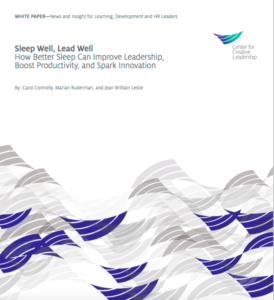Transparency is extremely important to us, so we are letting you know that we may receive a commission on some of links you click on from this page. See our disclaimer.
 Can better leadership be connected to better sleep? Increasing amounts of data indicate the answer is yes.
Can better leadership be connected to better sleep? Increasing amounts of data indicate the answer is yes.
In their paper Sleep Well, Lead Well: How Better Sleep Can Improve Leadership, Boost Productivity, and Spark Innovation, published by the Center for Creative Leadership, the authors “draw on current research about sleep and health to make the case that senior leaders — and everyone else working in challenging, complex situations – need to get more sleep.”
Why does good sleep matter? The CCL reports that:
- “The sleeping brain processes and organizes information.”
- “The sleeping brain helps the body’s stress response switch off.”
In turn, “these two functions… have an effect on memory, decision-making, attitudes, innovation and creativity throughout the whole day.”
The report offers tips — many of which can be integrated into an effective wellness approach:
- “Introduce the idea that more work isn’t better work: Any number of work practices and demands play into this assumption — working across time zones, accessibility via technology, heavy travel schedules, fears about being pushed out of a job and internal competition to name a few. Look for ways to question practices and assumptions that value hours working over impact and results.”
- “Get the word out about the benefits of sleep: Challenge the cultural notion that sleep is a waste of time or a weakness.”
- “Enlist a senior executive in your efforts: Share the science — people like to know that there is evidence behind a recommendation. Let people know that when they are tired, they are less effective as leaders and managers. Encourage them to view sleep as a simple, easy, cheap way to boost productivity and be more effective — and to do what they can to give their teams information and support to be rested.”
- “Create a ‘sleep awareness' program or campaign: On its own or as a component of an employee wellness program or a leadership development initiative.”
- “Factor sleep into policies and schedules: Alongside the culture and awareness messages, take a look at organizational policies and norms that discourage rest and recovery time. Consider time off after travel. Review schedules, break times and limits to hours or shifts. Work with teams or departments to set norms for cross-time zone availability and technology/accessibility expectations.”
